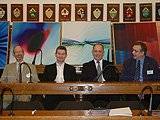Boosting Businesses through Digital Print
Date published: 22 April 2005
Three companies came together following research into the Rochdale textile and clothing sectors which was carried out in 2001 for the then Business Link Rochdale by Manchester Metropolitan University. This research looked at ways in which the sector could be strengthened. Upon reviewing the research findings, it became apparent that three companies has, between them, the core skills for developing a mass-customisation route for interior textiles.
A breakfast meeting held at the Town Hall this week brought these three companies together. A display of wall art and textile wall panels was exhibited in the Council Chambers of the Town Hall, along with some intriguing presentations on the benefits of digital print. The three companies involved are:
• Acton & Acton Ltd – had an existing business, manufacturing bedding products for individual consumers. The dimensions of the products were chosen by the customer, and fabrics were selected from a range of options.
• Direct Textile Imaging – developing as a sampling and photoshoot business, they were looking for ways of developing digital printing technologies to operate in new markets.
• J Clegg & Brosh - already offering a transfer printing service and had received a DTI SMART development grant to explore the different ways of preparing fabrics for digital printing.
• Manchester Metropolitan University – through an ERDF project delivering services to the NW England textiles cluster of companies, was already supporting small projects involving the digital printing of textiles, and was actively seeking to extend this work.
An outline proposal was submitted to the DTI in September 2001 and shortly afterwards the team met with a representative of the Consumer Goods and Services Directorate to discuss the idea in more detail. This led to a full proposal being submitted in the spring of 2002 and approval for the project was received in July 2002. Since then, regular monthly meetings have been held to monitor progress, chaired by Stephen Kay, the Textiles Business Advisor of Business Link North Manchester, who has also acted as project manager of the project.
The Direct Textile Imaging Company provides a digital sampling service to many of the high street retailers and has enjoyed consistent growth by meeting the increasing demands of its many customers.
John Clegg’s family has been in the textile industry for around 200 years. Based in a conversation area at Rakewood Mill, Littleborough, John has overseen the company’s transition from a traditional textile finishing plant to much greener’ working methods. Digital printing technology fits neatly into this strategy.
David Acton has spent 46 years in fabric development/marketing, working for English Sewing Cotton, Tootals, Viyella and Dewhursts on industrial apparel and interior textiles. He now manages his own business supplying customized interior textiles and is currently enjoying the cutting edge of digital printing and pursuing textiles “final frontier” that is fabric on walls.
Since March 2002, David Tyler has managed the North West Advanced Apparel Systems Centre, a European funded initiative to support clothing, textile and footwear companies in the North West of England.
David Tyler said that he was “excited about the potential of digital print.”
“It really is the future, everything is going digital.” He said, “We can now explore the different ways in which technology can be used. Even with clothing, we have the option to print 3D images on them, which opens up new doors to design innovations.”
David Acton from Acton & Acton Ltd said, “I’ve been into textiles for over 30 years now, my main interest being in wall art and textile wall panels. Digital printing opens up a lot of scope, there is a huge area in the market that is just there for the taking.”
Paul Noone from Direct Textile Imaging also acknowledged the significance of digital print: “I work closely with modern images. People also come to me with photos or text that they’d like to use, and we can use them to make cushions, roller blinds, mats and rugs etc. The options in digital print really are endless.”
The design potential of digital printing of textiles is only the beginning to be explored. Consumers are generally not aware that products from the digital route can have unique design features and are much more environmentally friendly than conventionally printed textiles. Although there is still much work to be done, this project has helped to move the technology closer to the consumer.
Do you have a story for us?
Let us know by emailing news@rochdaleonline.co.uk
All contact will be treated in confidence.
Most Viewed News Stories
To contact the Rochdale Online news desk, email news@rochdaleonline.co.uk or visit our news submission page.
To get the latest news on your desktop or mobile, follow Rochdale Online on Twitter and Facebook.




